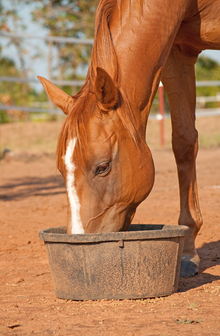The Daily Racing Forum has reported that the California Horse Racing Board has lifted a ban on the use of feed products made by Purina Mills at its Turlock, California plant.

Steroid-like drug in horse feed
The ban was instituted last month after Purina's horse feed products resulted in 48 positive tests for the banned medication zilpaterol, which is used to build mass in livestock.
The ban was instituted last month after the companyâs products resulted in 48 positive tests for the banned medication zilpaterol, which is used to build mass in livestock.
Purina executives and third party testers have made assurances that the feed no longer contains zilpaterol, and licensed feed vendors will be allowed to distribute Purina products that were milled since March 27th.
The positive tests occurred at the four racetracks operating in the state â Cal-Expo, Golden Gate Fields, Los Alamitos, and Santa Anita. The California Horse Racing Board has agreed to dismiss the 48 cases, all of which were found since March 1st.
According to Horse Science News, Zilpaterol is a feed additive used for producing rapid weight and muscle gain in cattle. It has anabolic properties, similar to the steroids infamously taken by some athletes to build muscles and give them a performance edge.
In the trial conducted by scientists at North Dakota State University, three healthy horses were fed zilpaterol. The horses' physical response was almost immediate. Within 25 minutes after taking zilpaterol, the horses became restless, started sweating profusely and developed muscle tremors. A few minutes later, their heart rates climbed.
Muscle tremors lasted for a week and the rapid heart rates lasted for up to two weeks before returning to normal. Blood tests revealed indications of muscle damage. One horse also apparently suffered kidney damage.
The horses received just two doses of zilpaterol before researchers halted the trail. Fortunately, by three weeks after their ordeal began all the horses had recovered without requiring any medical treatment.
